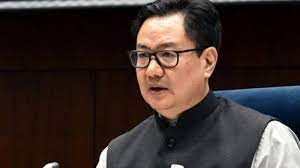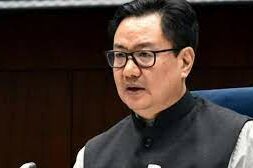
Rijiju Contradicts Allegations of some Retired Supreme Court Judges being Members of “Anti-India Gang”
Manas Dasgupta
NEW DELHI, Apr 8: Even while accusing the Congress of “building pressure on the judiciary” to secure a favourable judgement, the union law minister Kiren Rijiju has contradicted his own earlier charge that some retired Supreme Court judges were part of the anti-India gang.
While accusing the Congress of working against the interests of the country giving example of the Congress leader Rahul Gandhi allegedly “inviting” foreign leaders to interfere in the internal affairs of India, Rijiju had publicly stated that some former Supreme Court judges were also “part of the anti-India” gang campaigning against the Narendra Modi government.
However, in response to a written question by two Rajya Sabha members “whether as per the Union Minister for Law and Justice, a few former judges of the Supreme Court are part of an anti-India gang,” told the Upper House that the complaints his Ministry received regarding serving and retired judges concerned only with appointment and service conditions of serving members of the higher judiciary.
Rijiju was responding to a question by Samajwadi Party member Javed Ali Khan and Janata Dal-United’s Ram Nath Thakur. They also asked the Minister to reveal the source of the information and whether in view of national security, the government had informed the Chief Justice of India (CJI) and the Union Home Ministry about the alleged anti-national activities of the retired judges.
Their question follows a claim made by Rijiju in a television interview that some retired judges were part of the ‘anti-India gang’ that was targeting the Narendra Modi government. In the English version of the reply, the Minister evaded a direct answer but in the Hindi version, he said ji nahin [No] to sub-questions from A to D.
Rijiju had also accused the Congress leader Rahul Gandhi from trying to pressurise the judiciary when he was accompanied by his sister and the Congress general secretary Priyanka Gandhi Vadra, and a host of Congress leaders including three Congress chief ministers when he reached Surat sessions court last week to appeal for suspension of his conviction in the “Modi surname case.” The Congress instead had claimed that it was Rijiju who was pressuring the judiciary to fall in line with the government in respect of judicial appointments by levelling public accusation against higher judiciary.
“From time to time, complaints are received in the Department of Justice [in the Law Ministry] against sitting as well as retired judges of Supreme Court and High courts. Department of Justice is concerned only with the appointment and service conditions of the sitting judges of the Supreme Court and high courts,” the Minister said in the English version of his reply. He added that complaints related to the retired judges of the Supreme Court and the High Courts were not handled by the Department of Justice.
The Minister noted that accountability in higher judiciary was maintained through an “in-house mechanism” and recalled that the Supreme Court in its full court meeting on May 7, 1997 had adopted two resolutions: one dealing with restatement of values of judicial life and the other with in-house procedure for taking suitable remedial action against judges who do not follow universally accepted values of judicial life.
As per the established “in-house mechanism” for the higher judiciary, the CJI is competent to receive complaints against the conduct of judges of the Supreme Court and the Chief Justices of the High Courts. Likewise, the Chief Justices of the High Courts are competent to receive complaints against the conduct of High Court judges. “The complaints/representations received by Department of Justice are forwarded to the Chief Justice of India or to the chief justice of the High Courts concerned as the case may be, for appropriate action,” he added.
In response to another question, Rijiju had told the Rajya Sabha that the process of linking Aadhaar details with the voter identity card had not started yet while stating that the names of those who did not link their Aadhaar details with the voters’ list would not be struck off the electoral rolls.
“Linking of Aadhaar is process driven and no targets or timelines have been given for linking Aadhaar with Electoral Photo Identity Card. Linking of Aadhaar with the Electoral Photo Identity Card has not yet started so far,” Mr. Rijiju said.
Section 23 of the Representation of the People Act, 1950, as amended by the Election Laws (Amendment) Act, 2021, provides for the electoral registration officers to require the existing or prospective elector to provide the Aadhaar number for establishing identity on a voluntary basis.
The Election Commission had launched the programme to collect the Aadhaar number of existing and prospective electors on a voluntary basis from August 1, 2O22 in all the States and Union Territories. The Minister also said the time period to submit Aadhaar number had been extended up to March 31, 2024.














